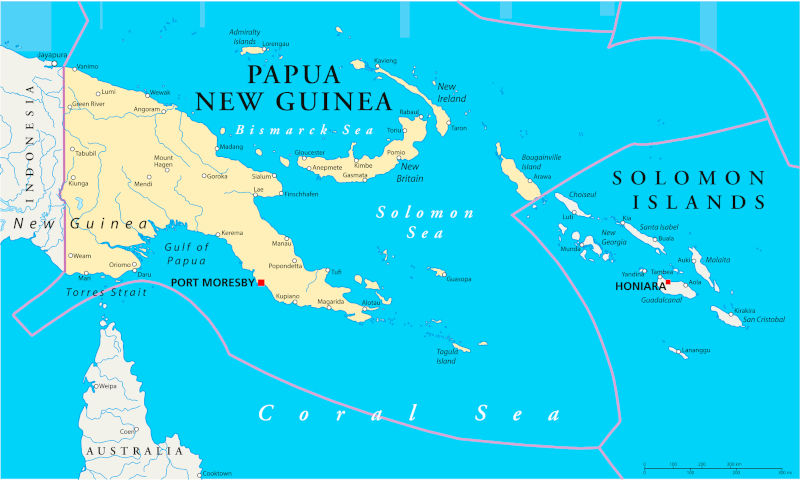A Potential China-Papua New Guinea Free Trade Agreement
Bilateral Trade Increased By 25% Between 2020 & 2021
Chinese Foreign Minister Wang Yi has been visiting Papua New Guinea’s Prime Minister James Marape in the Papuan capital, Port Moresby on the final leg of his Pacific Islands tour. Papua New Guinea is underdeveloped but has significant natural reserves, while China is already a major investor in the country and buys much of PNG’s gas, minerals, timber and other resources. Bilateral trade has increased from US$3.21 billion in 2020 to US$4.02 billion in 2021. Marape said that discussions with Wang had focused on economic cooperation and a long-discussed free trade agreement. Marape has also stated that he wants to move the PNG economy away from primary material exports to more lucrative finished product exports.
“China and Papua New Guinea officials are going through tidying Chinese-PNG free-trade arrangements,” Marape said on Friday (June 3). “The specifics of the free-trade arrangement are being finalised as we go through, so that Papua New Guinea interests are not suppressed or harmed, but maintained and improved.” The country is the world’s third largest island country with an area of 462,840 km2 and a population of about 9 million. Most Papuans are engaged in agricultural work. The national GDP is about US$35 billion with a per capita income of about US$2,500 per annum.

Papua New Guinea is a member of China’s Belt and Road Initiative, with the most influential BRI project in PNG being the first demonstration base of ‘Juncao Upland Rice Technology’, implemented by the team of Lin Zhanxi of Fujian Agriculture and Forestry University. The Juncao technology, which in Chinese means breeding fungi with herbaceous plants, has benefited 106 countries and regions by addressing poverty, soil erosion and desertification. It uses specific types of mushroom to turn poor soils into more productive pastures. In Papua New Guinea, 8,600 farm households employing 30,000 people have benefited.
Marape has said that “Mushrooms and rice, along with coffee, are now the most important high value crops in PNG’s highlands. Juncao is our grass for poverty alleviation and prosperity.”
Aside from agriculture, China and Papua New Guinea have also reached an agreement on the cooperation of the PNG Power Grid second phase project. The project was undertaken by a Chinese-funded enterprise, which can build transmission and distribution backbones for PNG’s highlands and mountainous provinces. It is conducive to solving the development “bottleneck” of the shortage of electricity supply in PNG. Chinese firms have also helped to build a large number of infrastructure projects such as the new six lane highway into the capital city, other roads, bridges, and several PNG regional airports, many of which were receiving air transport access for the first time.
Marape said that PNG has learned from China to establish special economic zones, and has yielded positive results, Marape said, noting that his country will continue to deepen bilateral pragmatic cooperation, expedite a free trade agreement with China, and provide convenience to Chinese investment in PNG.
Related Reading
About Us
Chris Devonshire-Ellis is the Chairman of Dezan Shira & Associates. The firm assists British and Foreign Investment into Asia and has 28 offices throughout China, India, the ASEAN nations and Russia. For strategic and business intelligence concerning China’s Belt & Road Initiative please email silkroad@dezshira.com or visit us at www.dezshira.com





